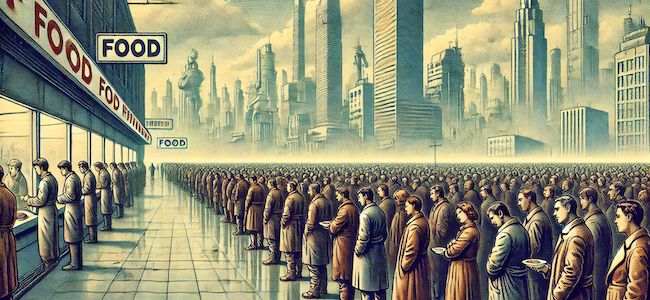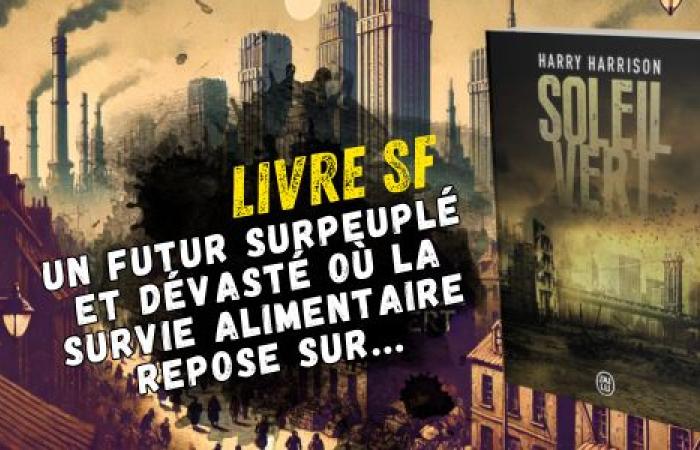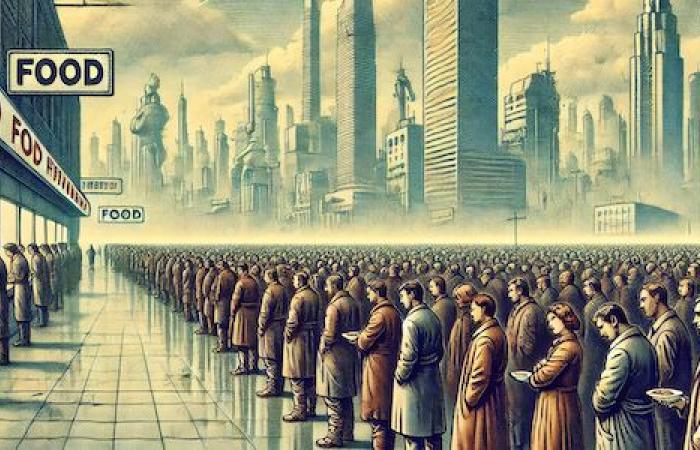CAN WE IMAGINE A FUTURE WHERE THE QUEST FOR PROFIT WOULD SACRIFICE ALL OF HUMANITY?
Auteur : Harry Harrison![]() First editor: Doubleday
First editor: Doubleday![]() First publication: 1966
First publication: 1966![]() ISBN : 978-2290079416
ISBN : 978-2290079416
This question is essential in Green sun (original title Make Room! Make Room!), Harry Harrison's iconic novel published in 1966. It takes place in an overpopulated, over-industrialized and ecologically devastated society where humanity seems to have lost its original orientation. Yet it is in this disastrous future, a future where ethics are sacrificed on the altar of survival, that Harrison pushes us to question our choices, not only in the social domain, but also spiritual and psychological. Indeed, the work questions the individual as a whole, from his relationships with society as a whole, but also to putting the fundamental concept of his own soul back on the table.
Moral sacrifice, exploitation of the masses and the unjustifiable commodification of human lives is the heart of this book. Green sun invites us to an introspection that goes beyond the simple framework of dystopia. He asks us how can a society dehumanized by the quest for profit influence the individual? And above all, to what extent are we prepared to sacrifice our own humanity in the name of this survival?
A society where the quest for profit devours ethics
In Green sunthe human race is on the verge of collapse. Global overpopulation, rampant poverty, extreme pollution and the disappearance of natural resources have transformed the planet into a huge dumping ground. In this stifling atmosphere, the dominant elite, responsible for this degradation (them again!), found a solution to the food crisis: the production of Green Sun, a food substitute made from… human corpses. This abomination, imposed as a pragmatic solution, becomes a reflection of extreme industrialization and the dehumanization of social relations. But more than that, it embodies a moral sacrifice imposed by a society where profit has become the ultimate objective to the detriment of all human considerations.
Ethics, once considered essential to building collective well-being, is today sacrificed for a form of economic “well-being”. It is this degradation of morality that Harrison explores with such acuteness. The quest for profit, coupled with the need to maintain social order, pushes humanity to turn a blind eye to the systematic exploitation of human life. People live in a state of denial, and society itself accepts that man is reduced to a mere resource in a merciless world. This is where the author questions us: how far can humanity go without losing what makes it unique?
Psychology of the individual in a dehumanized society
One of the strengths of the novel lies in the way it explores the psychological impact of this dehumanized world on its characters. Sol, the protagonist, is a tired and disillusioned police inspector, a man who embodies the inner struggle between his duty and the compromises he must make to navigate this corrupt society. Through his gaze, Harrison offers us a poignant reflection on the way in which the individual, crushed by social pressure and the compromises imposed by an unjust world, ends up lost in the system.
Psychologically, the world of Green sun is a place where hope is a rare commodity. Survival is not just a matter of living day to day, but of fighting against a heavy loss of meaning. Depression and apathy dominate the lives of many characters, who like Sol, have lost their ability to react to injustice. The novel therefore explores this disconnection of the human soul where the inability to perceive the truth and to fight against exploitation becomes a form of mental survival. Sol finds himself faced with a dilemma: can we still be human in a world where we must accept the unspeakable in order to simply live?

This quest invites us to reflect on the psychological impact of submission to unjust systems. How do these systems transform us? How far can the feeling of powerlessness lead an individual to accept the unacceptable to the point of no longer questioning the nature of human suffering? It is this suffering which is at the heart of the book, a collective and individual suffering which arises from the impossibility of escaping from a society which we have constructed and which we accept despite everything.
A great sacrifice for humanity?
But beyond these aspects, Green sun also opens up spiritual questioning. Through this dehumanized society and the production of food from human bodies, Harrison raises a profound issue about respect for human dignity and what constitutes the essence of humanity itself. The sacrifice of human life for economic survival poses a fundamental question: how far can a society go before losing its soul?
In a world where spiritual principles are relegated to the background in favor of material survival, the question of redemption becomes central. Indeed, Green sun not only describes a world in decline, but it questions us about what it means to be human in such a world. The company in Green sun seems not simply to be a consumer society, but a soulless society, where spirituality and ethics are erased in the name of economic necessity.
It is in fact this little thing that is lost when a society forgets its spiritual and human roots. By choosing to survive at all costs, this society loses the ability to rise beyond mere survival. It forgets that humanity also lies in the ability to live in harmony with others, to respect the dignity of each human being, and to preserve a form of spiritual connection to life. The sacrifice of a human life to feed other human beings highlights what is lost when we forget the intrinsic value of each individual.
Petite introspection
In light of these elements, Green sun becomes more than a simple warning against the dangers of unbridled industrialization. It pushes us to personal introspection, particularly in our current world, where the excesses of consumption and the commodification of human life are an increasingly palpable reality. Harrison's work invites us to take ourselves back and master the food production chain again, but above all to reconsider the dignity that we grant to others.
Perhaps we need to rethink our values and question the hierarchy of priorities that governs our societies. The fundamental question posed by Green sun is timeless. And it is our own place in this world that we must question. The danger is real: we risk losing ourselves in a world where morality and ethics become outdated concepts, forgotten in favor of survival at all costs.
See you soon fiction fans!
Let's continue this discovery of Harry Harrison's novel together through the episode of my podcast dedicated to it.








